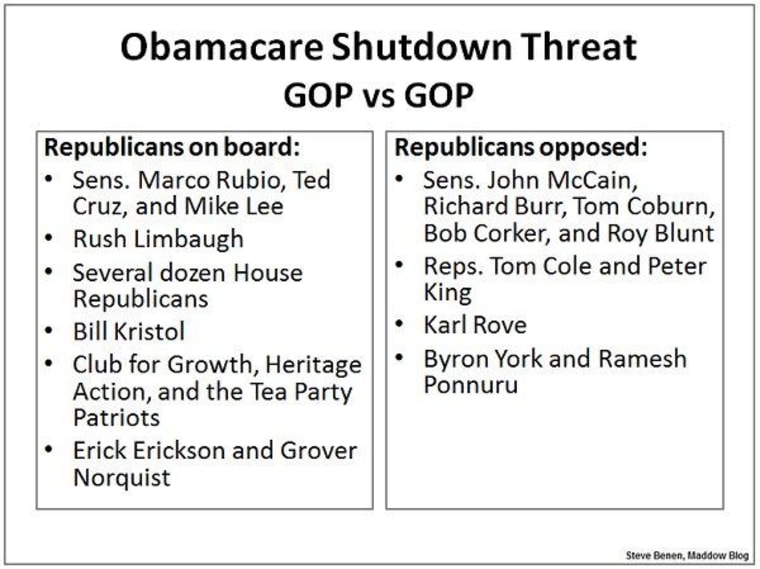Sen. Mike Lee (R-Utah) was on Fox News the other day, defending his plan to shut down the federal government rather than finance the federal health care system. The far-right senator insisted "this really isn't about Republican versus Democrat. It's not about liberal or conservative."
And in a way, that's true -- it's really about Republican versus Republican, conservative against conservative.
I put together this image to offer a lay of the land, because when it comes to the government-shutdown threat, GOP fissures are coming to the fore in a way we haven't seen in a while. While Republican divisions are not uncommon, it's rare when conservative GOP senators, asked about a prominent idea from other conservative GOP senators, say, it's "the dumbest idea I've ever heard of."
Indeed, even today, the divisions are becoming more pronounced. Sen. Bob Corker (R-Tenn.) -- not exactly a New England moderate from the Rockefeller wing -- told msnbc the plan from his far-right colleagues is "silly" and not at all "courageous." Around the same time, the Weekly Standard's Bill Kristol, relying on a strained metaphor, argued that conservatives must "stop the train. Stop it dead in its tracks before more damage is done. If this means disrupting the quiet car that so many in the Republican establishment enjoy riding in, so be it."
No, you're not the only one who found it amusing to see Bill Kristol -- Bill Kristol! -- complaining about the "Republican establishment."
You'll also notice, incidentally, that House Speaker John Boehner, Senate Minority Leader Mitch McConnell, and none of the other members of the GOP congressional leadership in either chamber make the above list. There's a good a good reason for that: in this Congress, Republican leaders are generally afraid to lead, and prefer to wait on the sidelines where they won't get hurt.
Regardless, as we look ahead, there are two principal questions to consider: whether the shutdown scheme will come to fruition and what these over-the-top antics will mean in the larger legislative context.
On the former, I think it's safe to say the unhinged wing of the GOP is going to be disappointed. To actually shut down the government because Democrats refused to take health care away from millions of struggling families is, for lack of a better word, hopelessly insane, and to pull this off, Republicans would need a united front. As the above image should help reinforce, these guys are anything but united.
As such, even the ring leaders of the scheme see the writing on the wall.
The conservative plan to use the resolution that funds the government to cripple the president's health-care law has a problem, according to GOP Sen. Ted Cruz: other Republicans."The problem right now is we don't have Republicans willing to stand up and do this," Cruz said Monday on The Andrea Tantaros Show, a conservative radio program.
Soon after, Cruz hung out with Glenn Beck -- Glenn Beck! -- to whine about those darned congressional Republicans who are too "scared" to start undermining the nation on purpose.
Of course, this isn't necessarily an awful scenario for Cruz -- he gets to rant and rave with impunity for the next several weeks, knowing that none of his rhetoric will actually affect public policy. The manufactured drama makes Cruz look weak and ineffectual, but that hardly matters to the senator -- the Texas Republican has no real intention of legislating anyway.
This isn't to say the pro-shutdown caucus is giving up - more than 50 right-wing groups co-signed a letter of support yesterday, rallying behind the Rubio/Cruz/Lee threat -- but there's generally an understanding that this is a scheme with a short shelf life.
But is there any larger significance to this? Maybe. It's certainly problematic when a struggling political party is pitted against itself over the merits of a radical scheme, but there may be other practical considerations to keep in mind.
In the House, for example, if a good chunk of the majority caucus is convinced that they have to defund "Obamacare," it means GOP leaders will have to rely on quite a few Democratic votes to approve a continuing resolution to prevent a shutdown. Will Nancy Pelosi and Democratic leaders leverage this opportunity? You better believe it.
It's always been one of the more entertaining aspects of GOP radicalism: more often than not, it's self-defeating.
